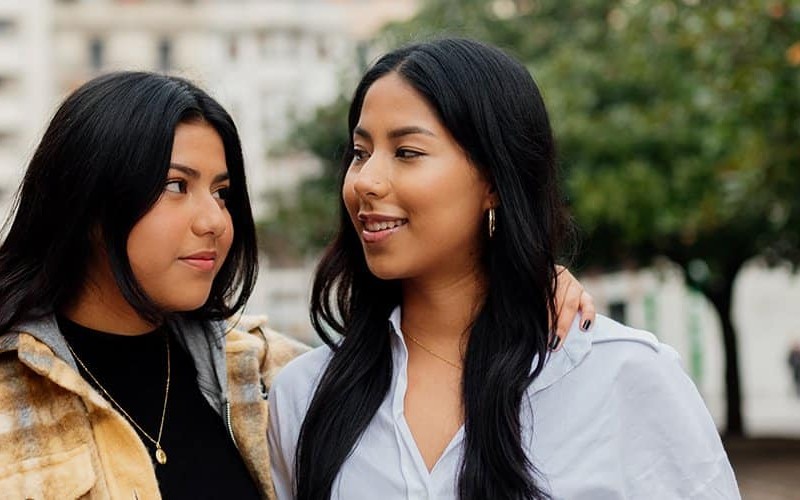An Eldest Daughter’s Journey From People Pleasing to Setting Boundaries
From a young age, eldest daughters are taught to prioritize others, often at the expense of their own needs. But what happens when people-pleasing becomes too heavy a burden?

Growing up as the eldest Latina daughter in my family was a badge of honor. It was a role drenched in tradition, expectation, and responsibility. From a young age, I was conditioned to prioritize everyone else’s needs before my own. “La mayor tiene que dar el ejemplo,” mom would often remind me. This familial expectation, combined with the cultural norm of putting family above all else, sowed the seeds of my people-pleasing tendencies.
People pleasing wasn’t just about being agreeable; it became a way of life. A constant endeavor to maintain harmony, to ensure everyone was happy, and to avoid any hint of conflict. On the surface, this might sound noble, even selfless. But over time, it became a heavy cloak that weighed down on my mental health.
Here’s a glimpse into the mind of a chronic people pleaser: Every “yes” feels like a silent victory, while every “no” feels like a personal failure. There’s a constant fear of disappointing others, an unending desire to be liked, and a relentless pursuit of validation. All this, often at the cost of my own happiness, needs, and desires.
In the early days, I believed that the love and respect I received from my family were directly proportional to my ability to cater to their needs. But as I grew older, I began to notice the strain this was causing. I was emotionally exhausted, always second-guessing my decisions, and often felt like a hollow version of myself.
Navigating the waters of cultural expectations and familial roles as the eldest daughter often comes with hidden currents of emotional manipulation. Within many Latino families, there’s an unspoken code that binds us to a legacy of care, sacrifice, and duty. While many of these expectations are rooted in love and tradition, they can sometimes be wielded as tools of emotional leverage.
The pressure to conform can be intense, and any deviation might be met with feelings of guilt, shame, or the dreaded label of being “ungrateful.” It’s a delicate balance, understanding where genuine concern ends and manipulative tactics begin. I grappled with this intersection, often questioning if my choices stemmed from authentic desire or were the result of subtle emotional coercion.
One evening, after an emotionally draining family gathering where I once again found myself bending over backward to ensure everyone else’s happiness, I had an epiphany. Was it really worth it? Was it truly my responsibility to bear the weight of everyone else’s contentment? That night, I took a deep look within and realized that the respect I sought from others needed to start with self-respect.
Recovery wasn’t immediate. It was, and still is, a journey. I had to unlearn the age-old belief that my worth was tied to my ability to please. I had to confront the deeply ingrained fear of being perceived as “selfish” or “ungrateful.” I had to learn to set boundaries. And more importantly, I had to constantly remind myself that it’s okay to prioritize my own needs.
Recognizing my people-pleasing tendencies was my first step toward healing. It wasn’t just about seeing them, but understanding them—acknowledging the patterns, the triggers, and the barrage of emotions that came with every “yes” I forced out and every “no” I swallowed. With this self-awareness came the need to place myself at the forefront, not as a sign of arrogance or neglect of my loved ones, but as a necessary act of self-preservation.
But how does one prioritize self-care in a culture that often equates personal time with selfishness? For me, it started with small acts. Taking an afternoon to immerse myself in a good movie, going for a walk all by myself, or even just allowing myself to decline an invitation without the weight of guilt. Slowly, these small affirmations of my worth began to build into a newfound respect for my own well-being.
However, untangling years of ingrained behavior wasn’t something I could manage alone. Seeking therapy became my refuge. Through sessions filled with introspection, I was provided with tools and perspectives that allowed me to see my value outside of my role as the perpetual pleaser, learn the significance of boundaries and the beauty of assertiveness.
Being the eldest Latina daughter shaped me in countless ways, both challenging and rewarding. I cherish the values, resilience, and love I inherited. However, understanding the importance of breaking free from the chains of people-pleasing has been instrumental for my genuine happiness and mental well-being.
Remember, prioritizing yourself isn’t selfish; it’s essential. We can only share genuine love and happiness with the world when we first find it within ourselves.




